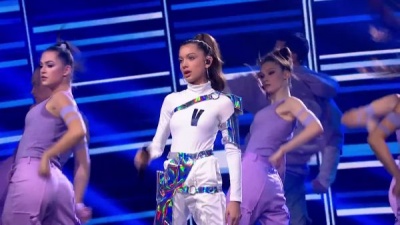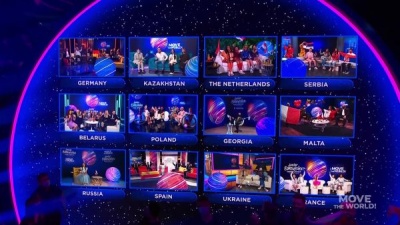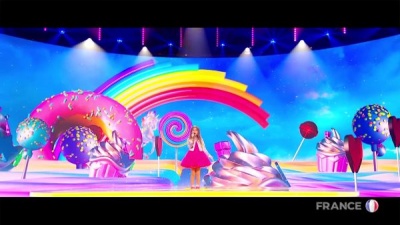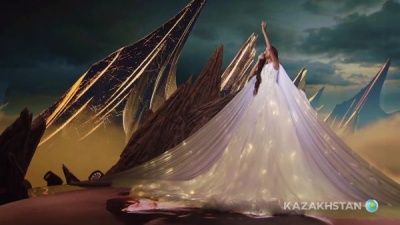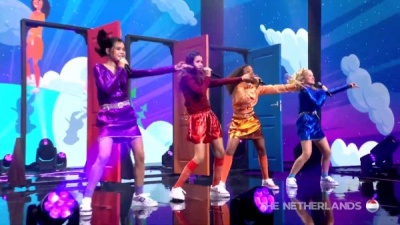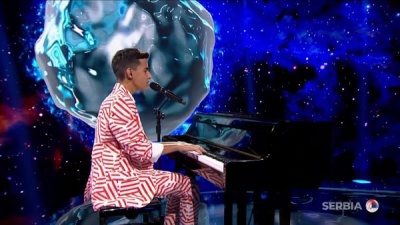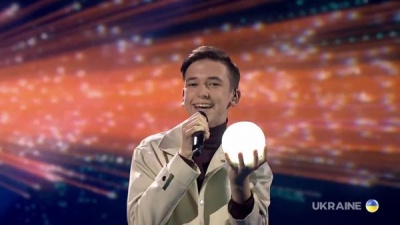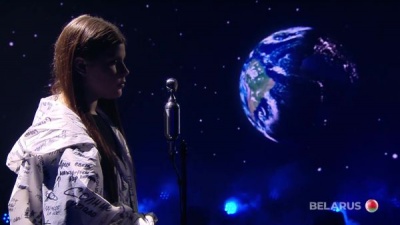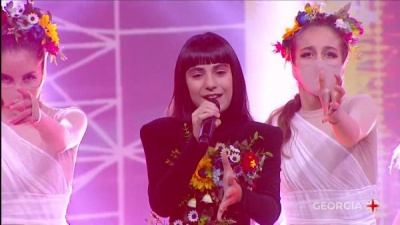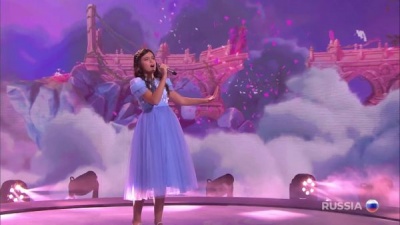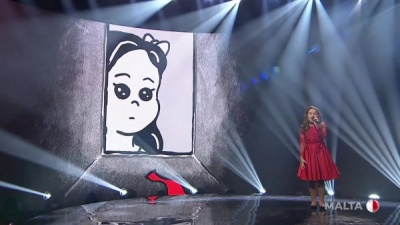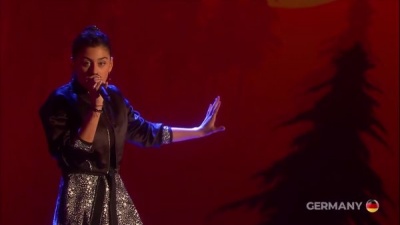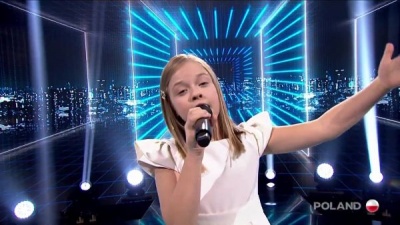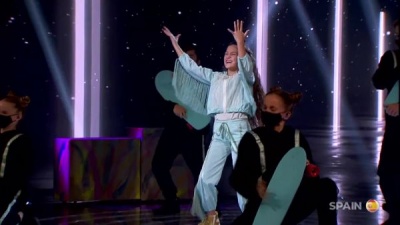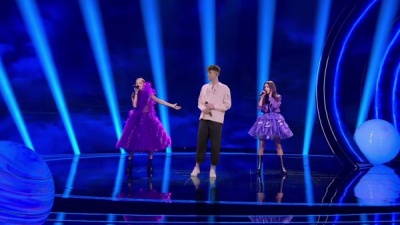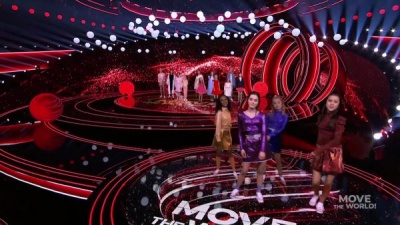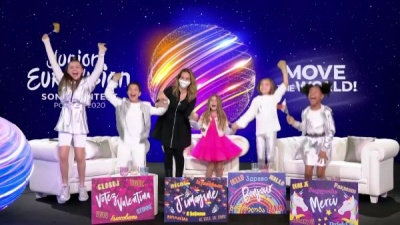Weaver's Week 2020-12-06
Last week | Weaver's Week Index | Next week
Coming up: three Eurovision winners perform on one stage, and other technological innovations.
Contents |
Junior Eurovision Song Contest
TVP for Eurovision, 29 November
A very different Junior Eurovision this year, the premier contest for young singers goes ahead with just a few small tweaks. And that is the biggest success of all: the changes didn't materially hurt the show. Sure, it was different, but it wasn't worse.
Performers were recorded on a Eurovision-standard stage in their home broadcaster's studio, so didn't need to travel to Warsaw. Each of the delegations spent Sunday afternoon together in a green room, all shown on the big screen in Warsaw.
As is tradition, last year's winning singer returns to reprise their winning song. Viki Gabor now has a small army of superheroes behind her, and the performance is doubtless the one they've been rehearsing all year.
By tradition, there's a parade of flags next. What with one thing and another, they didn't bother with the flag parade, replacing it with a brief message from the participants in their native language. We prefer this idea, we get to see the singers, hear them talk a little, and see them in their home element. Doubt it would scale up to the Senior contest with its twenty zillion songs.
There's a very small audience in the studio, making as much noise as they can. Small audience, big noise, and there's a proper buzz about the show. Three hosts for the programme, which feels a bit of overkill.
Premier class!
"J'imagine" won for Valentina, a France Télévisions entry ("France" on screen). Every so often, Junior Eurovision gives us a simple song about how it's wonderful to be alive. France Télévisions take this idea and run with it. A young girl in a bright pink dress, singing first in front of a backdrop of European landmarks, then a medley of doughnuts and lollipops and unicorns, and finally in front of a swaying Eiffel Tower. The chorus transcends language, it goes "La la la, la la la, la la la, la la la, j'imagine".
It's a riot of colour, life, vibrancy. And it's the 2020 winner, topping the jury vote by an inch, and the internet televote by a mile. This is most unusual, the childish songs rarely rise up to the podium. "Sommer og skolefri" and "Happy day" walked so that "J'imagine" could soar.
Second place was claimed by "Forever". Karakat Bashanova performed the song, representing Khabar Agency ("Kazakhstan"). It's a touching ballad about the loss of someone you love – in Karakat's case, her father; for much of Europe, people we know and respect. Mournful, respectful, indomitable. The staging was up to Khabar Agency's tremendous standards, a huge light-up mountain dress that sprouted angel's wings. Second place amongst the juries and third in the televote translated to second overall.
Third place went to "Palante", Soleá performed for TVE ("Spain"). Another upbeat song, flamenco pipes and Latin beats reinforce the central message that she's moving forward. We found the staging to be confused and messy, and Soleá's performance to be a little bit off-pitch. Juries agreed, and ranked this sixth; the podium place comes from second place in the televote.
In fourth, our gals from Unity, "Best friends" represented AVROTROS ("The Netherlands"). Naomi, Maud, Jayda, and Demi each have their own colour dress, and each have their own colour door to dance around. The group's been put together specifically for JESC, and given the boppiest bop of the night. The song is a simple sentiment expressed with laser-like focus. Junior Eurovision speaks the common language of Poplish, a simplified strain of English as a second language, and "Best friends" sticks rigidly within that limited code. Fifth place with the juries feels right; fourth with the televoters.
Standard-plus
There weren't many upbeat songs this year – it's slow numbers almost all the way below here – and they rose to the top of the pile. The producers had chosen for a happy, celebratory mood, but most of the competitive songs were slow and contemplative. Can we argue that the happy numbers were more in keeping with the fizzing introduction? Or is it simply that the slow songs were indistinctive and slightly mushed together?
Just two male vocals this year. Petar Aničić performed "Heartbeat" for RTS ("Serbia"). The lad is feeling all the emotions, and wondering if he dare speak of his love, or to his love, for fear of rejection. During the performance, Petar stands up from a piano to make his way across the stage.
"Vidkryvai (Open up)" was performed by Oleksander Balabanov representing NTU ("Ukraine"). This is an absolute grower of a song, Oleksander has the confidence to face his future, to a contemporary and catchy beat. The staging is simple – Oleksander has one of the lit-up balls from The Wall, cradles it like the sun, and moves from darkness into hope. He's also got a tremendous vocal range, shifting effortlessly from chest voice to falsetto. Seventh place on the night, it feels like one we'll come back to in the years to come.
Another one that grew on us like a rash: "Aliens", performed by Arina Pehtereva for BTRC ("Belarus"). The striking mood is established from the very first shot: girl, microphone, Earth. There are slogans scrawled on her hoodie, and it's all so moodily lit. As the song progresses, we see brief cuts to other performers, holding the Earth in their hands and looking concerned. It turns out to be a blast on environmental concerns, the theme from last year.
BTRC have thrown the kitchen sink at this: moody and melancholic, there's a rap break in the middle and a jury note at the end where the world blows up. Third with the juries, fifth on the televote, fifth overall. We've never yet seen a broadcaster submit a song to both Junior and Senior contests: BTRC could do much worse than try with this song.
"You are not alone" promised Sandra Gadelia for GPB ("Georgia"). Another of the songs about the health crisis, and dealing with it by being nice to each other. There's a striking visual image here: Sandra is the flower maiden, as four nymphs dance around in synchronised and mirrored movement. (A year ago, we'd have said the nymphs were "silenced": now, not so sure.) Sandra also has a tremendous vocal power, the song grows from a quiet ballad through to a power stormer, via a wonderful whistle note. Fourth with the juries, but went completely over the televoters' heads for sixth overall.
"My new day" from Sofia Feskova represented RTR/C1R ("Russia"). It's this year's uplifting ballad, the sort they'd play near the end of act two of a Disney movie. The backing animation, the limited range, the chord structure, even Sofia's pale blue chiffon dress enhance the image. Perhaps a bit too calculating and cynical even for this competition, and perhaps a little bit behind the times – cod-Disney was the calling card circa 2014. Tenth place only, and perhaps deserved a little more.
"Chasing sunsets" from Chanel Monsigneur was for PBS ("Malta"). A sweet song about savouring the moment we're in. Chanel was eclipsed by her own backing animations, their story overshadowed the song. Almost all broadcasters kept their performer in tight shot throughout, it let us connect with their emotions rather than admiring the artwork on the projection screen behind. It's a shame Chanel was overpowered: she's got a promising vocal, and – at nine years old – could well be back in a year or two.
"Stronger with you" was performed by Susan, representing ARD/ZDF/KiKA ("Germany"). It's a sweet song, done at a very moderate pace. Susan has spectacular stagecraft, she moves like she owns the place, but a forgettable song will do her no favours. This came last, and last by quite a margin, and it's not a huge surprise. We hope for better next year, this is a learning curve.
"I'll be standing", Ala Tracz for TVP ("Poland"). The three-peat proved impossible, the hometown entry finished ninth in both halves of the voting and ninth overall. Ala had the only upbeat song to miss the mark, it was more of a groove and a dance routine than a competitive song. Perfectly fine to listen to, but there was no call to action.
What can we learn from this contest?
Before the event, the Eurovision fandom had wondered if large audiences on TVP's main station would translate into lots of votes. Turns out that no, people will tend to vote for the songs they like best, and not just because it's their flag on the hometown entry. The internet vote remains a problematic fave for two reasons. First, acts can mobilise their large social media followings to vote in their favour. Valentina this year, Fource a few years back, both used their existing fandoms to win the televote.
There is a structural observation: people do still vote for the flag. There is a massive online fandom for Eurovision entries marked "Spain", and the fandom is vociferous in its support. Any online poll will be tilted towards their preferred entry. Those marked "Russia" and "Azerbaijan" have been associated with ballot-stuffing in the past, too. Junior Eurovision tends to find a consensus winner – the jury has half the marks, and we know they're voting honestly, and it's very difficult to score more than about 15% of the available online points. We still wouldn't care to use this online vote as a replacement for the televote at Senior Eurovision, though we might use it as an additional vote.
What didn't work in this show? Almost nothing gave us cause for concern. The only thing they might have improved: link-ups to the various green rooms across the continent. There's still a delay between Warsaw and Köln, often the host came close to falling over the answers from the contestants. It wasn't as slick as we've come to expect, or as polished as the rest of the show. Take nothing away, though. The idea to have all the contestants in their green rooms was a great one, and it ensured the show remained live and fresh and vibrant throughout.
What really worked? The interval act. If you see nothing else, watch the interval act. Viki Gabor, Roksana Weigel, and Duncan Laurence perform "Arcade" on stage together. Viki's soprano, Roxy's alto, and Duncan's baritone combine for the most remarkable Eurovision performance of the year. It's made even more remarkable by the technology behind the performance: while Viki and Roxy are in the studio in Warsaw, Duncan is in his studio in Hilversum and appears by video-editing hologram technology.
The other interval acts: a dance performance came and went. A song by Alicja who would have represented TVP in Rotterdam, and might well have given Viktoria a run for the wonning. This year's common song was also stitched together by hologram technology, which worked so long as everyone remains on the spot. Unity were allowed to do dance moves, and had to be placed well away from the others. Such is technology in 2020, it'll look naff by 2025.
The next logical step – and one they might be able to pull off by May – is a virtual green room. Have the host appear on screen to talk with the delegation from the remote location.
The Eurovision-standard stage worked for the Junior contest, it was small and intimate, like many of the 70s and 80s contests we've seen on Eurovision Again. It might not be flexible enough for the senior contest. They could recycle an idea from 1996, and have three distinct stage areas, and allow delegations to pick which of the plans they'll use. All delegations to next year's Senior contest will be required to supply a backup performance, one the EBU can use if the performer is indisposed, or the event cannot proceed. Different staging will allow for some variety on screen.
If you've not seen a Junior Eurovision contest before, this is a good point to jump in. It's short – a little less than two hours from Te to Deum – and all the songs are good, great, or excellent.
In other news...
In a change to the advertised schedule, the EBU's Rose d'Or awards have been postponed. They'll now be handed out next Wednesday afternoon. A special award will be given to David Attenborough, the BBC2 controller and nature documentarian.
TV Times magazine has given out the TV Times Awards on schedule. Voted by the readers, winners included Ant and Dec (favourite presenter), Beat the Chasers (favourite game show), and Strictly Come Dancing (favourite entertainment show).
More challenges for top chefs, as Snackmasters comes back on Channel 4 (Thu). Monday quizzing returns to Radio 4, as Counterpoint kicks off its 2021 series.
With the calendar turning to December, we get some Advent specials of entertainment shows – 8 Out of 10 Cats put theirs on E4 on Sunday. CBBC gives seasonal editions of The Dog Ate My Homework (Thu) and Crackerjack! (Fri).
Next Saturday has footballers on Celebrity Supermarket Sweep (ITV), comedians on Pointless Celebrities (BBC1), and the Strictly Come Dancing semi-final.
Photo credits: TVP / EBU.
To have Weaver's Week emailed to you on publication day, receive our exclusive TV roundup of the game shows in the week ahead, and chat to other ukgameshows.com readers, sign up to our Google Group.


